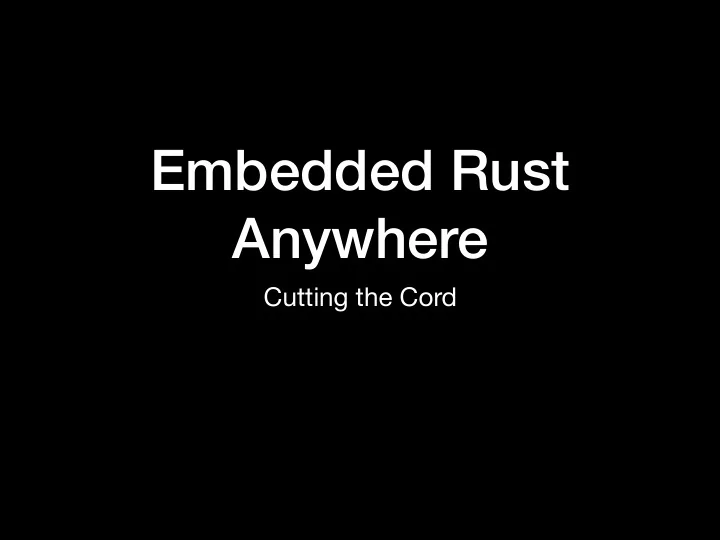

Embedded Rust Anywhere Cutting the Cord
How we got here • We build modern appliances, starting with the June Intelligent oven • Early software was tied to it's host platform and UI toolkit • Next generation of appliance software is modular, portable, and scalable
Choosing Rust • Considered C or C++ as the obvious performant & portable choices. • Many of our application developers come from Go, Swift, Obj-C and Java. • We weren't eager for the memory management issues and unpredictable failure modes C or C++ often bring. • Though young, Rust o ff ered good guarantees and modern syntax. • After vetting its interoperability story, we were in.
Choosing Rust • Great cross-compilation support • Share appliance code with mobile applications • Configuring a `-sys` crate and build.rs can be easier than working with other build systems. • Explicit control over memory allocation
A Whole New System • Our first new appliance is an embedded system, no_std • Vendor board support is in C, and they don't support Rust • Existing embedded team is comfortable doing board bringup in C • To reduce risk, we brought the system up in C
Divide and conquer • Divided the system into modules, interfaces defined in C • Appliance and HMI modules in Rust • Drivers & HALs in C • Networking and storage in C • Module interfaces free of platform-specific types
Divide and conquer HMI Appliance Comm API HAL Drivers
Divide and conquer uint8_t appliance_on_message(uint8_t *ptr, uint16_t length); bool comm_send_status(uint8_t *ptr, uint16_t length); void hmi_on_action_button_pressed( void ); void hmi_on_appliance_status(appliance_status_t *); void hmi_update( void ); void hal_set_led(led_t id , led_state_t state, effect_t effect); void hal_set_display( char *chars, uint8_t symbols, effect_t effect); void hal_get_temp_data(thermometer_t *thermometer); uint32_t hal_get_ticks( void );
Device and Simulator • Appliance and HMI logic is purely cross-platform • HAL implementation rewritten in the simulator - UI widgets in place of hardware • Device-specific networking and storage code is isolated within a submodule, reimplemented in the simulator
Device and Simulator HMI Appliance Common Comm API Hardware-specific HAL Drivers
Device and Simulator HMI-screen Appliance lvgl Common Comm API Hardware-specific HAL Drivers
Simulator benefits • Faster than bringup • Limited hardware • Simulate hardware I/O • Simulate network tra ffi c • Early integration with mobile apps • Verify tricky hardware edge cases
Sample HMI/app lvgl Common API Hardware-specific HAL Drivers
Sample // Driver module API extern void drivers_init( void ); extern void drivers_set_led(LEDs which, bool on); extern bool drivers_is_button_pressed(); // HMI module API extern void hmi_init( void ); extern void hmi_update( void ); // LittlevGL bindings lv_disp_drv_register(&displayDriver)
Try it! • Example repo: github.com/junelife/rust-anywhere • Targets STM32F429 Discovery board • Defines API for display, LEDs, and buttons • Build and run as simulator or on device
Try it!
A Tour of the Sample • device • Embedded app based on LittlevGL demo app, written in C • Provides board bring up and configuration, main application loop • simulator • macOS application, written in Swift • Provides simulated UX and hosts shared logic • crates • Rust workspace • Contains both shared and platform specific code
Rust Workspace • Top level static libraries • libdevice, libsimulator • Common application logic • api, ffi , lvgl/lvgl-sys, hmi • Platform specific code • board, drivers
Debugging the Simulator • Rust works great with LLDB and GDB debuggers • Integration with popular IDEs like Visual Studio Code or CLion • Xcode plugin support: • https://github.com/mtak-/rust-xcode-plugin
Conclusion • Invaluable to distribute demo software to developers, designers, testers, partners • Isolates device-specific bugs • Strong module boundaries make it easier to replace implementations (C with Rust) • Appliance crates will be reused on devices with a full OS
Thanks! • Come visit us at the first Impl day! • We're hiring! juneoven.com/careers
Recommend
More recommend